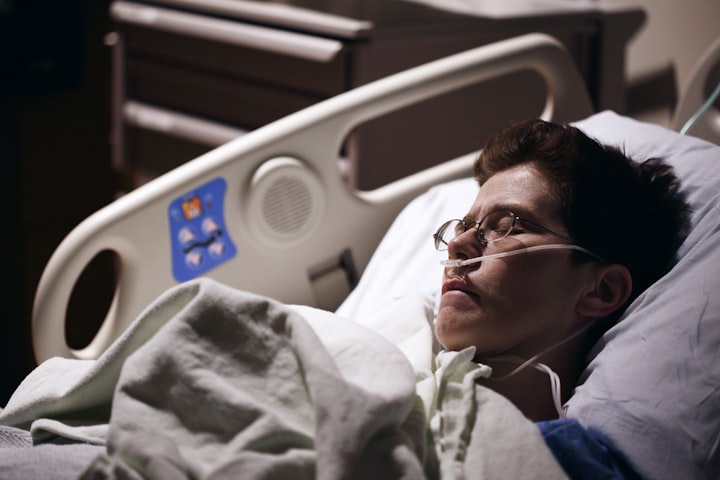How Doctors Prevent Illness While Traveling
Traveling can be an exciting and enriching experience, but it also comes with the risk of falling ill

Traveling can be an exciting and enriching experience, but it also comes with the risk of falling ill. Whether you're traveling for leisure or business, it's crucial to take steps to protect your health and prevent illness. Doctors play a crucial role in ensuring the well-being of travelers by providing valuable advice, vaccinations, and preventive measures. In this blog post, we will explore the importance of preventing illness while traveling and how doctors can help in this regard.
The Importance of Preventing Illness While Traveling
Preventing illness while traveling is essential for several reasons:
1. Personal well-being: Falling ill during your trip can have a significant impact on your overall travel experience. It can ruin your plans, cause discomfort, and even require medical attention in an unfamiliar destination.
2. Productivity: If you're traveling for business, being healthy is crucial for maintaining productivity and achieving your goals. Falling ill can disrupt your schedule and hinder your ability to perform at your best.
3. Safety: Certain illnesses can pose significant risks to your safety and even your life. For example, contracting diseases like malaria or dengue fever in certain regions can have severe consequences if left untreated.
How Doctors Can Help
Doctors play a vital role in ensuring the health and well-being of travelers. Here are some ways in which doctors can help prevent illness while traveling:
1. Pre-travel consultation: Doctors can provide valuable pre-travel consultations, during which they assess your health and medical history, provide necessary vaccinations, and offer advice on specific health risks related to your destination.
2. Vaccinations: Doctors can administer vaccines to protect against common travel-related illnesses such as hepatitis, typhoid, yellow fever, and others. Vaccinations are essential for maintaining immunity against diseases prevalent in certain regions.
3. Prescription medications: If you're traveling to a region with a high risk of certain diseases, such as malaria or traveler's diarrhea, doctors can prescribe preventative medications to reduce your chances of falling ill.
4. Travel health advice: Doctors can provide essential advice on how to stay healthy while traveling, including tips for food and water safety, insect bite prevention, and general hygiene practices.
By seeking the guidance and expertise of doctors, travelers can take proactive measures to protect their health and prevent illness during their journeys. It's essential to consult with a healthcare professional well in advance of your trip to ensure you're adequately prepared. Remember, a healthy traveler is a happy traveler!
II. Vaccinations and Immunizations
When it comes to traveling, staying healthy is a top priority. Doctors understand the importance of preventing illness while traveling and often recommend vaccinations and immunizations to protect against common diseases. Here are some key points to consider:
Common Vaccinations for Travelers
There are several vaccinations that doctors commonly recommend for travelers, depending on the destination and specific risks involved. Some of the most common vaccinations include:
1. Hepatitis A: This vaccination protects against the hepatitis A virus, which can be contracted through contaminated food and water.
2. Typhoid: The typhoid vaccination helps prevent typhoid fever, a bacterial infection that can be contracted through contaminated food and water.
3. Yellow Fever: Yellow fever is a viral infection transmitted by mosquitoes in certain regions. The yellow fever vaccination is required or recommended for travel to these areas.
4. Malaria: While there is no vaccination for malaria, doctors may prescribe anti-malarial medications for travelers visiting regions with a high risk of malaria transmission.
Why Doctors Recommend Them
Doctors recommend vaccinations and immunizations for travelers to protect against various diseases that may be prevalent in certain regions. Here's why they are recommended:
1. Disease Prevention: Vaccines help protect travelers from contracting diseases that may be uncommon or non-existent in their home countries.
2. Peace of Mind: By getting the necessary vaccinations, travelers can feel more confident and at ease during their trip, knowing they have taken steps to protect their health.
3. Compliance with Entry Requirements: Some countries have specific entry requirements, including mandatory vaccinations. By getting the required vaccinations, travelers can ensure a smooth entry into their destination country.
4. Personal and Public Health: By getting vaccinated, travelers not only protect themselves but also contribute to public health by preventing the spread of diseases to others.
For more information on vaccinations and immunizations, consult with a healthcare professional or visit the Centers for Disease Control and Prevention (CDC) website. It's important to discuss your travel plans and health concerns with a doctor well in advance of your trip to ensure you have enough time to receive the necessary vaccinations and boosters. Prevention is key when it comes to staying healthy while traveling, and vaccines play a crucial role in that process.
III. Medication and Prescription Management
Tips for Traveling with Medications
When traveling, it's essential to manage your medications properly to ensure your health and well-being. Here are some tips to help you travel with medications:
1. Plan Ahead: Make sure you have enough medication to last throughout your trip, including a few extra days' supply in case of unexpected delays.
2. Pack Properly: Keep your medications in their original containers and pack them in your carry-on bag to ensure easy access and prevent loss or damage.
3. Carry Documentation: Carry a copy of your prescriptions, as well as a letter from your doctor explaining your need for the medications. This can be helpful when going through airport security or if you need to refill your prescription while traveling.
4. Research Medication Laws and Regulations: Some countries have strict laws regarding the importation of certain medications. Make sure to research the laws of your destination country to avoid any legal troubles.
5. Store Medications Properly: Keep your medications in a cool and dry place, away from direct sunlight. If you have medications that require refrigeration, make sure to pack them in a small cooler with ice packs.
How Doctors Help with Prescription Needs
Doctors play a critical role in helping patients manage their prescription needs while traveling. Here are some ways doctors can help:
1. Providing Prescriptions: Doctors can prescribe medications that may be necessary for travel, such as anti-malaria medications or antibiotics for travelers' diarrhea.
2. Ensuring Adequate Supply: Before your trip, doctors can review your medications and ensure you have an adequate supply to last throughout your journey.
3. Recommending Travel-Specific Vaccines: Doctors can provide information about travel vaccines that may be necessary based on your destination. They can administer the vaccines or provide recommendations for local clinics that offer them.
4. Offering Medical Advice: Doctors can provide advice on how to stay healthy while traveling, such as avoiding certain foods, practicing good hygiene, and managing chronic conditions.
5. Referral to Specialists: If you have specific medical needs while traveling, doctors can refer you to specialists who can provide additional care or medical advice.
Doctors understand the importance of maintaining good health while traveling and can provide guidance, prescriptions, and advice to ensure a safe and healthy trip. It's always a good idea to consult with your doctor before traveling to address any concerns or specific medical needs.
IV. Personal Hygiene Practices
Maintaining good personal hygiene is crucial for preventing illness while traveling. Here are some doctor-recommended hygiene practices that can help keep you healthy on your journey:
Doctor-Recommended Hygiene Practices
1. Wash Your Hands: Regularly washing your hands with soap and water is one of the most effective ways to prevent the spread of germs. Make sure to wash your hands before eating, after using the restroom, and after touching surfaces in public places.
2. Use Hand Sanitizer: When soap and water are not readily available, use an alcohol-based hand sanitizer that contains at least 60% alcohol. Apply the sanitizer to your hands and rub them together until they are dry.
3. Avoid Touching Your Face: Touching your face, especially your eyes, nose, and mouth, can introduce germs into your body. Try to avoid touching your face as much as possible.
4. Cover Your Mouth and Nose: When you cough or sneeze, make sure to cover your mouth and nose with a tissue or your elbow. This helps prevent the spread of respiratory droplets that can contain harmful bacteria or viruses.
5. Practice Proper Food and Water Safety: When traveling to countries with different sanitation standards, be cautious of the food and water you consume. Avoid eating undercooked or raw foods, and drink bottled water or boiled water to avoid waterborne illnesses.
Preventing Illness Through Cleanliness
Keeping yourself and your surroundings clean is essential for preventing illness while traveling. Here are some cleanliness practices that can help protect your health:
• Clean Surfaces: Use disinfectant wipes or sprays to clean commonly touched surfaces, such as doorknobs, light switches, and airplane tray tables. This helps eliminate germs and reduce the risk of infection.
• Use Travel Pillow and Blanket Covers: If you use a travel pillow or blanket provided by the airline, consider bringing a cover or using a personal one to minimize contact with potentially contaminated surfaces.
• Stay Hydrated: Drinking plenty of water helps flush out toxins from your system and keeps your body hydrated, which can strengthen your immune system.
• Take Showers Regularly: Taking showers can help remove dirt, sweat, and bacteria from your body, reducing the risk of skin infections and other illnesses.
By following these hygiene practices and maintaining cleanliness, you can significantly reduce the risk of falling ill while traveling. Remember to prioritize your health and well-being during your journey.
V. Advice on Travel Insurance
Travel insurance is an essential aspect of any trip, including when traveling for leisure or business. It provides financial protection against unexpected events such as medical emergencies, trip cancellations, or lost luggage. Doctors can offer valuable advice on travel insurance, ensuring you have the coverage you need during your travels.
Why Travel Insurance is Important
1. Medical Emergencies: When traveling abroad, you may face unfamiliar environments and medical systems. Having travel insurance ensures access to quality medical care without incurring high out-of-pocket expenses.
2. Trip Cancellations: Unexpected events, such as illness or unfavorable weather conditions, can disrupt your travel plans. Travel insurance can help recoup non-refundable expenses, such as airfare or accommodations.
3. Lost or Delayed Luggage: Losing your belongings or experiencing luggage delays can be inconvenient and stressful. Travel insurance can provide coverage to replace essential items and compensate for the inconvenience.
How Doctors Can Assist with Insurance Information
Doctors play a crucial role in providing expert guidance on travel insurance and ensuring you have the necessary coverage for your specific health needs. Here's how doctors can assist with insurance information:
1. Pre-existing Medical Conditions: Doctors can help assess your medical history and provide documentation required by insurance companies regarding pre-existing conditions to ensure accurate coverage.
2. Vaccine and Medication Recommendations: Depending on your travel destination, certain vaccinations or medications may be recommended. Doctors can advise on necessary immunizations and prescribe appropriate medications, which are essential for insurance coverage.
3. Emergency Medical Assistance: In the event of a medical emergency during your trip, doctors can provide remote guidance by phone or email to insurance providers or local medical facilities, ensuring you receive appropriate care.
It's important to consult with your healthcare provider, such as a primary care physician or a travel medicine specialist, for personalized advice on travel insurance. They can recommend reputable insurance providers and tailor the coverage to your specific needs.
Remember, having travel insurance provides peace of mind and financial protection, allowing you to enjoy your trip without worry.






Comments
There are no comments for this story
Be the first to respond and start the conversation.